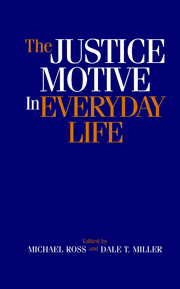Book contents
- Frontmatter
- Contents
- List of Contributors
- Introduction
- Theoretical Perspectives on the Justice Motive
- Victim Derogation and the Belief in a Just World
- The Justice Motive and Prosocial Behavior
- 11 Just World, Social Responsibility, and Helping Behavior
- 12 Policies to Redress Social Injustice: Is the Concern for Justice a Cause Both of Support and of Opposition?
- 13 Justice and Empathy: What Motivates People to Help Others?
- 14 The Justice Motive and Altruistic Helping: Rescuers of Jews in Nazi-Occupied Europe
- 15 Acting Righteously: The Influence of Attitude, Moral Responsibility, and Emotional Involvement
- Justice-Based Reactions to Transgressors
- Justice and Reaction to One's Own Fate
- Name Index
- Subject Index
15 - Acting Righteously: The Influence of Attitude, Moral Responsibility, and Emotional Involvement
Published online by Cambridge University Press: 08 September 2009
- Frontmatter
- Contents
- List of Contributors
- Introduction
- Theoretical Perspectives on the Justice Motive
- Victim Derogation and the Belief in a Just World
- The Justice Motive and Prosocial Behavior
- 11 Just World, Social Responsibility, and Helping Behavior
- 12 Policies to Redress Social Injustice: Is the Concern for Justice a Cause Both of Support and of Opposition?
- 13 Justice and Empathy: What Motivates People to Help Others?
- 14 The Justice Motive and Altruistic Helping: Rescuers of Jews in Nazi-Occupied Europe
- 15 Acting Righteously: The Influence of Attitude, Moral Responsibility, and Emotional Involvement
- Justice-Based Reactions to Transgressors
- Justice and Reaction to One's Own Fate
- Name Index
- Subject Index
Summary
Many people feel that nuclear weapons are potential sources of injustice. Even if used to prevent an attack or to retaliate, they would kill thousands, indiscriminately and undeservedly. Yet the Senate of the United States has refused to ratify the Comprehensive Test Ban Treaty, the Department of Energy is restarting tritium production, and a congressional committee has called for an immediate start on the designing of new nuclear warheads (Defense Monitor, 1999). While some citizens believe the United States should continue to maintain its nuclear superiority, polling data repeatedly show that a majority favor nuclear disarmament (Kay, 1998). Given their majority status, why do the many citizens who are opposed to nuclear weapons fail to press for nuclear disarmament? Why is it hard for peace organizations to mobilize individuals to demand nuclear disarmament, or to make it an issue in election campaigns? One reason involves a relationship between perceived efficacy and justice. If people believed that they could convince the government to move toward nuclear disarmament, then many might demand disarmament in order to avoid the possibility of killing hundreds of thousands of innocent people. However, most people doubt that they can influence governmental policy and prevent nuclear war. Hence, to engage in any individual action advocating nuclear disarmament implies the possibility that nuclear war might really occur. This requires relinquishing the belief that the person is living in a just world (Lerner, 1980).
- Type
- Chapter
- Information
- The Justice Motive in Everyday Life , pp. 271 - 288Publisher: Cambridge University PressPrint publication year: 2002
- 8
- Cited by

